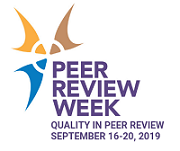
Johns Hopkins UniversityEst. 1876
America’s First Research University
Peer Review Week: Singing the Unsung

“Do not publish this book!”
This is the shortest peer review I’ve ever received, and by far, the most direct. In five short words, it spoke volumes. I can’t tell you who wrote it—that would violate a trust—but I can tell you the book never saw the light of day. Most peer reviews are more constructive, but this one stands out in my mind for its, well, minimalism.
Most peer reviews are less declarative and less decisive. Some run ten pages or more describing the book’s ideas and improvements the author could make. The reviewer who takes her charge seriously—to provide constructive feedback about the potential book—creates something that the book’s author will find useful. It’s also terrifically flattering. What, after all, is more satisfying than knowing that someone has read your work, thought about it, and responded to it?
University presses vary greatly in their size and scope, but the one aspect that unites them is their reliance on peer review. We use peer review to help decide what we publish. Since editors can’t be an expert in every field in which they acquire, they use other scholars who are “peers” of the author to help assess the work’s quality. These prepublication reviews do more than just protect the gate; they also help shape the projects we do take on.

The best reviews do something more than just a five-word caution. The best ones think along with the author and the editor, and engage both in a conversation. They can be some of the most satisfying intellectual exchanges I’ve seen, as if the reviewer were saying to the author, “I get what you’re trying to say here, and I think it is important—here’s how you could say it better.”
Part of peer review’s beauty is that it happens anonymously. The author doesn’t know who the reviewer is, and editors protect that privacy because we want the reviewer to be able to speak frankly. I doubt whether the reviewer who wrote, “Do not publish this book!” would have been as bold had they not been behind that curtain. The review’s privacy allows for a more honest, if somewhat painful, conversation.
Of course, this privacy means that peer reviewers rarely get the credit they deserve. Some have made books infinitely better for their advice. It’s the reason we celebrate Peer Review Week—our small way of saying thanks to the unsung heroes of scholarly publishing.
This week on our blog, we’ll be sharing guest entries by some of our authors who have benefited from this process. Historian John Thelin describes how rejection has made him a better writer. Public health scholar Susan Noonan writes about being on both sides of the process as both the reviewer and the reviewed. Finally, Kathleen Fitzpatrick shows how peer review is really a form of mentoring and thus a consummate act of generosity, an idea I find deeply compelling.
Greg Britton is the Editorial Director at Johns Hopkins University Press. You can follow him on Twitter at @gmbritton.
This post is part of our celebration of the fifth annual Peer Review Week, with the theme “Quality in Peer Review”. Come back each day for insight from one of our book authors into the role of peer review in their work.



